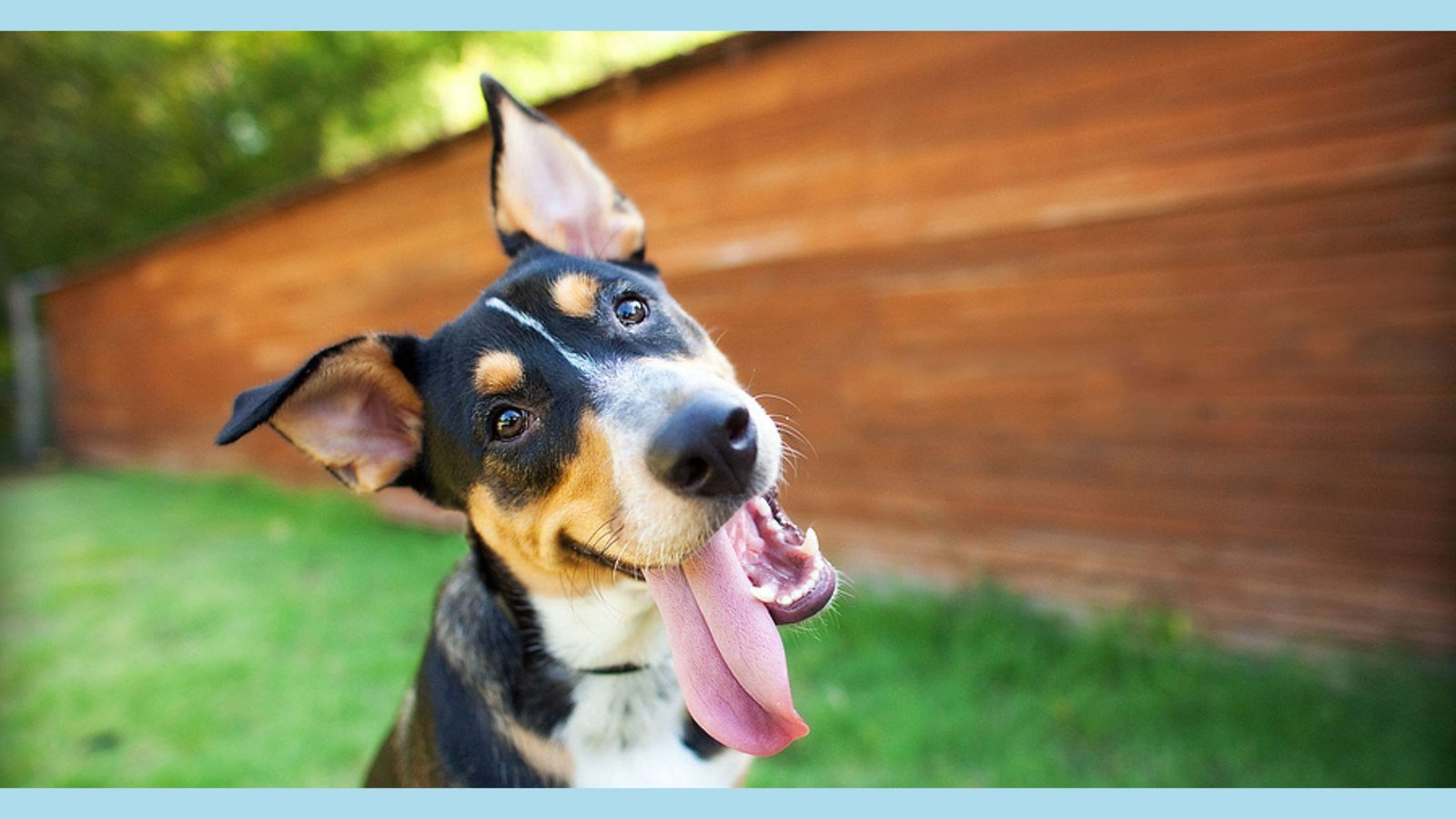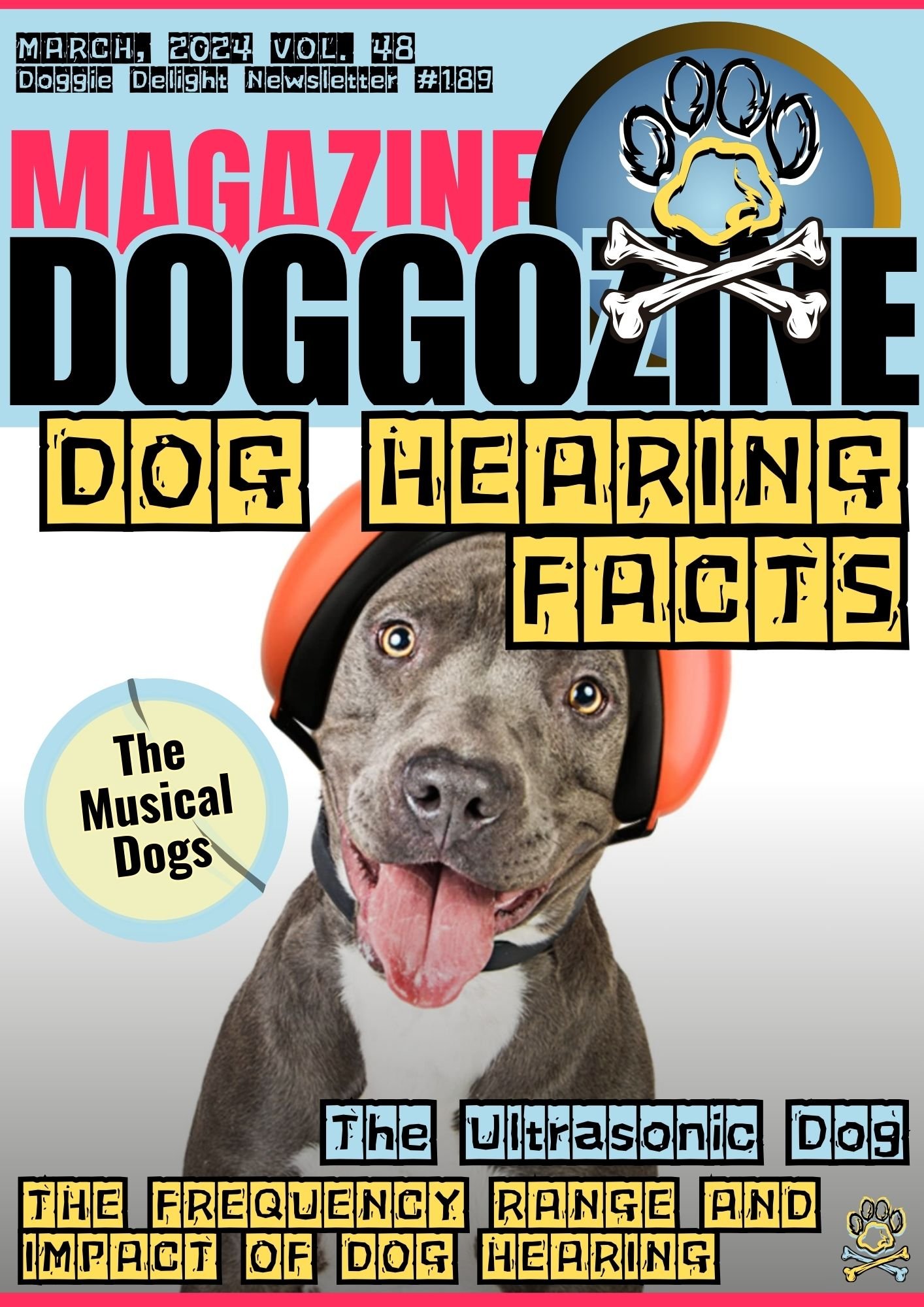
WHAT SOUNDS CAN DOGS HEAR THAT HUMANS CAN’T?
Dog hearing is much better than human hearing. They can hear sounds at higher and lower pitches. For instance, dogs can hear the high sounds made by small animals like mice or bugs. This skill helps hunting dogs find prey. Dogs can also detect low rumbling noises that humans miss. Examples are earthquakes, thunderstorms, or distant car engines. This helps them sense vibrations we can’t feel.
High-Pitched Sounds and Low Rumbles
When dogs hear these low rumbles, they may act worried or restless. That’s because they feel the vibrations and pressure changes too. A dog’s exact hearing range varies by breed and age. Some breeds like Dalmatians or Basset Hounds have extra wide hearing ranges. Puppies start with very high-pitched hearing that gets lower as they grow up.
Understanding what dogs can hear is important. For owners, it helps create a calm home without scary noises. Avoiding loud or high-pitched sounds prevents stress for dogs. Their excellent hearing is why dogs often react before humans realize something is happening.
The Ultrasonic Dog
Moreover, the knowledge of a dog’s hearing range is also utilized in various industries. For instance, ultrasonic dog deterrents are devices that emit high-frequency sounds that are unpleasant to dogs but inaudible to humans. These devices are commonly used to deter dogs from entering certain areas or to prevent them from engaging in unwanted behaviors.
The frequency range of a dog’s hearing is a remarkable attribute that sets them apart from humans. Their ability to perceive sounds within a wider spectrum allows them to detect high-pitched sounds and low-frequency vibrations that are beyond our capabilities. Understanding and respecting a dog’s hearing range is essential for their well-being and for effectively communicating with our furry companions.
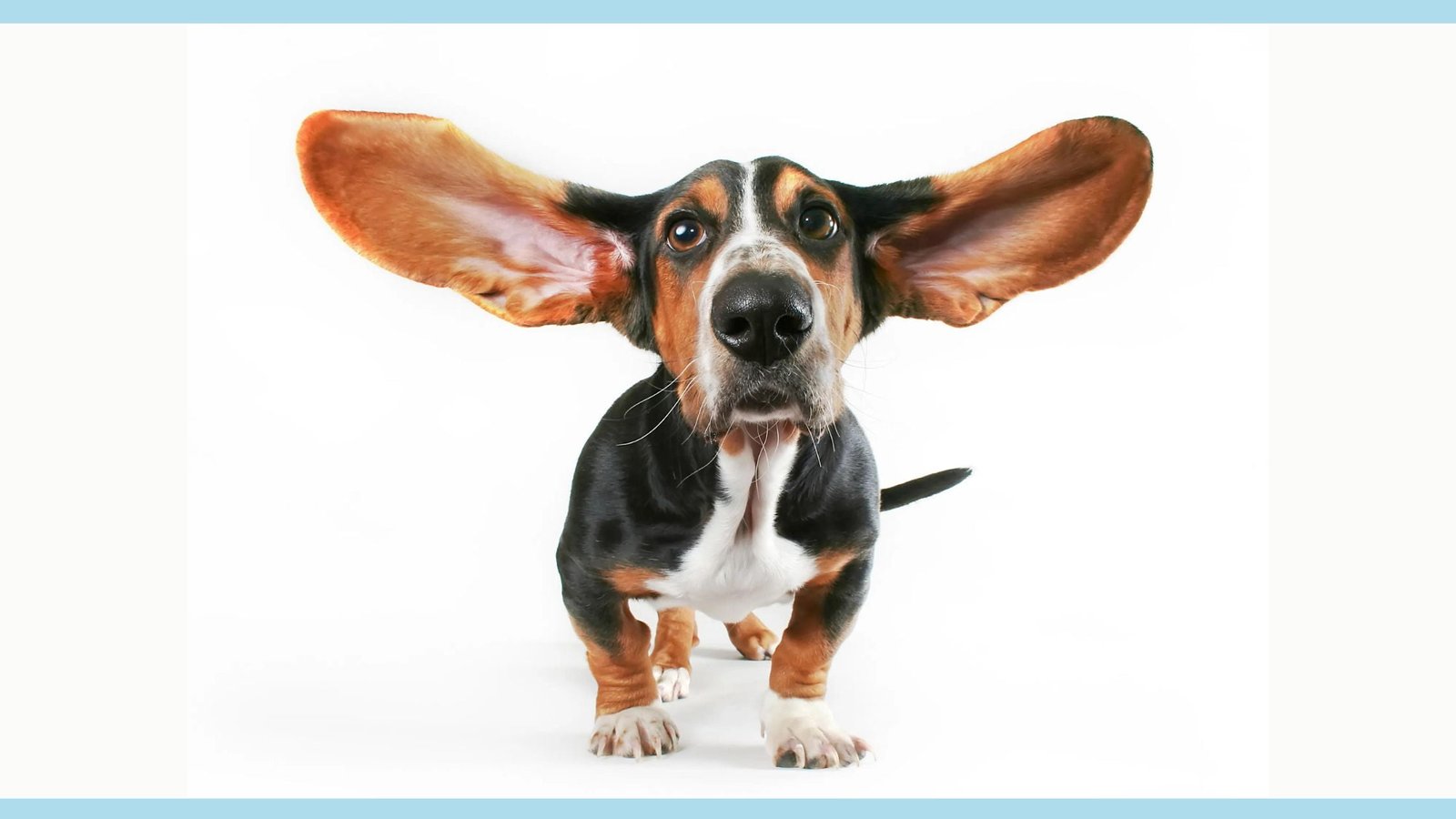
DOG BREED AND HEARING ABILITIES
The general frequency range of dog hearing remains consistent, but there are different dog breeds that make variations in this range. Some dog breeds can detect sounds at lower frequencies or higher pitches, and have more acute hearing than others.
For example, certain hound breeds, such as the Bloodhound or Basset Hound, are known for their exceptional sense of smell, but they may not possess the same level of hearing ability as other breeds. On the other hand, breeds like the German Shepherd or Border Collie are renowned for their keen hearing and are often used in police and search-and-rescue operations.
Hearing Abilities Within a Dog Breed Is Genetics
Hearing differs among dogs, even those of the same breed. Some pups may hear better than others due to genetics – traits inherited from parents. Breeders who work to produce dogs with good hearing can help create pups with exceptional ears. As dogs age, like humans, their hearing may get worse. Regular vet visits help catch any hearing issues so treatment can help.
Where a dog lives and how it’s trained also impact its hearing abilities. Loud noises, such as in cities, can damage a dog’s hearing over time, making it harder to hear certain sounds. But training a dog to respond to specific sounds, like whistles or commands, improves its awareness of those noises. Socializing young dogs by exposing them to various sounds helps too – they learn to distinguish different noises and pitches.
Dogs That are Trained to Respond to Specific Sounds
While breed plays a role, each dog’s unique hearing depends on genes, age, environment and training. Some may inherit exceptional hearing from parents. As they get older, regular vet care ensures any hearing decline is treated. Loud surroundings can damage hearing, but proper socialization and training improves sound recognition abilities. Dogs taught specific commands become attuned to associated noises like whistles.
Hearing variations exist even among the same breed due to genetics. But breeders focused on producing strong hearing, proper vet care, suitable environments and targeted training can optimize each dog’s abilities. Young pups exposed to many sounds develop better discernment. Older dogs may experience some expected decline, but attentive owners can enhance remaining capabilities through specialized activities.
Every dog is different. Some dogs can hear better than others. This depends on many things, like their breed, genes, age, environment, and training. It’s important to understand your dog’s hearing to take good care of them.

DOG AGE AND HEARING
Just like humans, dogs’ hearing changes as they get older. Puppies are born deaf, but can hear in a few weeks. By two months old, most puppies have full hearing.
Hearing Loss in Older Dogs
As dogs age, their hearing gets worse. This is called age-related hearing loss or “presbycusis.” Older dogs may have trouble hearing high sounds or responding to commands they used to hear. It’s key for owners to watch for hearing changes as their dog ages. Regular vet visits can catch any hearing problems.
Presbycusis is normal for older dogs. Some dogs only partly lose hearing, while others go fully deaf. The exact cause isn’t known, but genes, loud noise over time, and ear structure changes likely play a role. It varies how bad a dog’s hearing loss gets.
Beware Of Dog Ear Infection or Blockage
It is important for dog owners to be aware of the signs of hearing loss in their pets. Some common signs include not responding to their name being called, not reacting to loud noises, sleeping through loud sounds that would normally startle them, or becoming more easily startled by sudden movements.
If you suspect that your dog may be experiencing hearing loss, it is crucial to consult with a veterinarian. They can perform a thorough examination of your dog’s ears and conduct hearing tests to determine the extent of the hearing loss. In some cases, hearing loss may be reversible if it is caused by an underlying condition such as an ear infection or blockage. However, in most cases of presbycusis, the hearing loss is permanent.
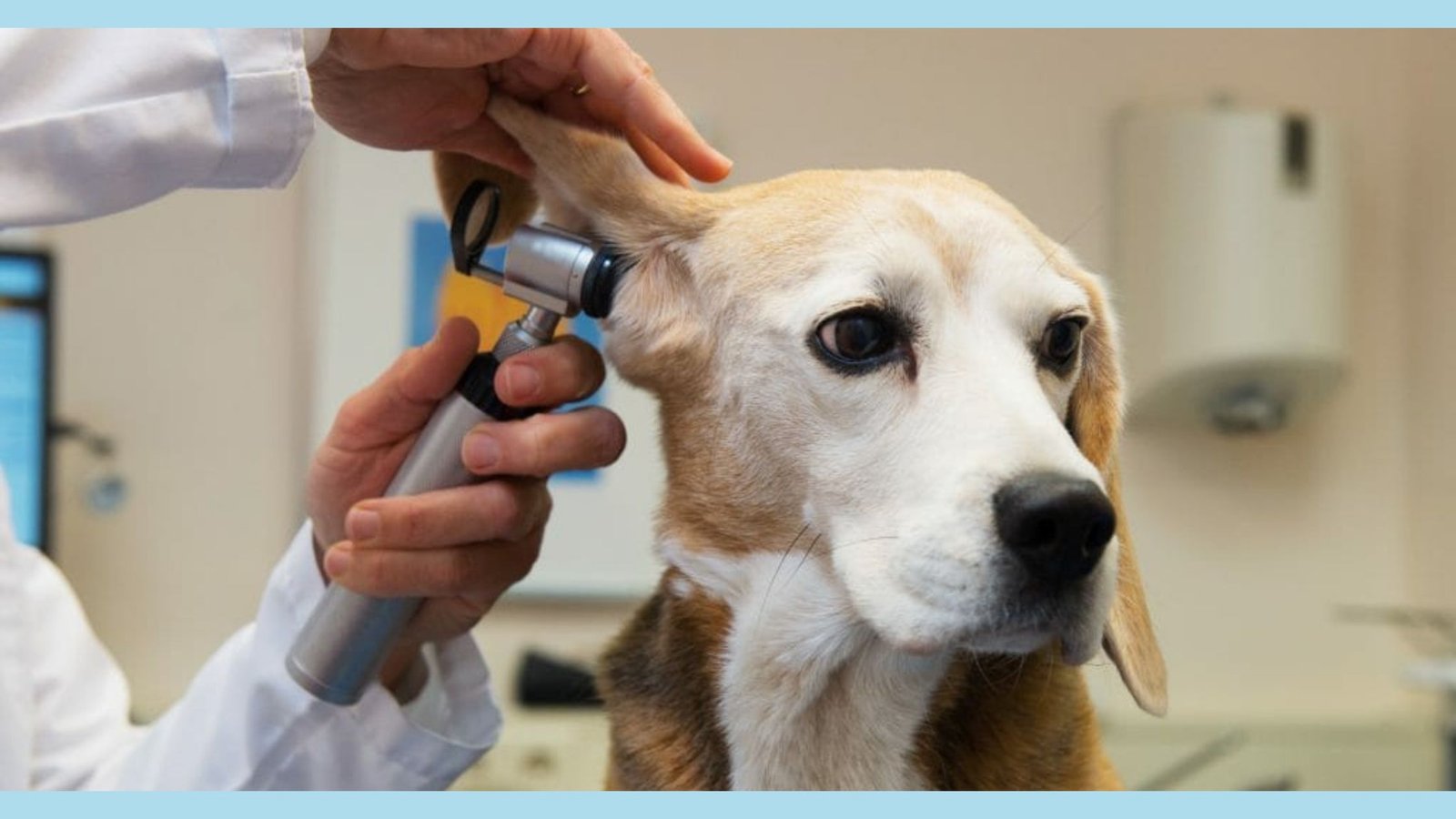
HOW TO HELP YOUR HEARING-IMPAIRED DOG
While there is no cure for age-related hearing loss in dogs, there are ways to help manage the condition and improve your dog’s quality of life. One option is to make environmental modifications to reduce background noise and make it easier for your dog to hear important sounds. This can include using carpeting or rugs to absorb sound, closing windows to minimize outside noise, and using white noise machines to mask distracting sounds.
Training a Hearing-Impaired Dog
Training techniques can also be helpful in communicating with a hearing-impaired dog. Using visual cues such as hand signals or flashing lights can help your dog understand commands and signals. Additionally, there are devices available, such as vibrating collars or remote-controlled vibrating mats, that can be used to get your dog’s attention when they cannot hear verbal commands.
As dogs get older, it’s common for them to have trouble hearing. But dog owners can help their pets feel better in this situation. Pet parents should take their dogs for regular vet check-ups. Being aware of signs of hearing loss is key. Making changes around the house can also help dogs hear better. These things make sure older dogs are happy and comfy. Plus, hearing lets dogs talk to each other.
Dogs pick up on tiny changes in how other dogs bark, growl, and whine. This shows different feelings and what dogs want. It helps dogs decide who’s in charge. They can show if they’re scared or want to fight. They also use sounds to play and mate. Besides talking, hearing keeps dogs safe and feeling good. They can hear if a danger like a predator is coming. They notice new sounds around them.
Music Can Help Dogs
This alertness means dogs can protect themselves and their owners fast. A dog’s hearing also affects their senses overall. They can enjoy music by hearing melodies, rhythms, and harmonies. Some studies show that certain music like classical or calm tunes can make dogs feel better and behave better.
Still, loud or sudden noises can bother dogs’ great hearing. They might get anxious, scared, or really dislike loud sounds. Thunderstorms, fireworks, or noisy appliances could upset them.
Dogs have amazing ears that can pick up all kinds of sounds. Their hearing is way better than ours. It helps them stay safe and communicate. But super loud noises can hurt their sensitive ears. So as dog owners, we need to protect their hearing.
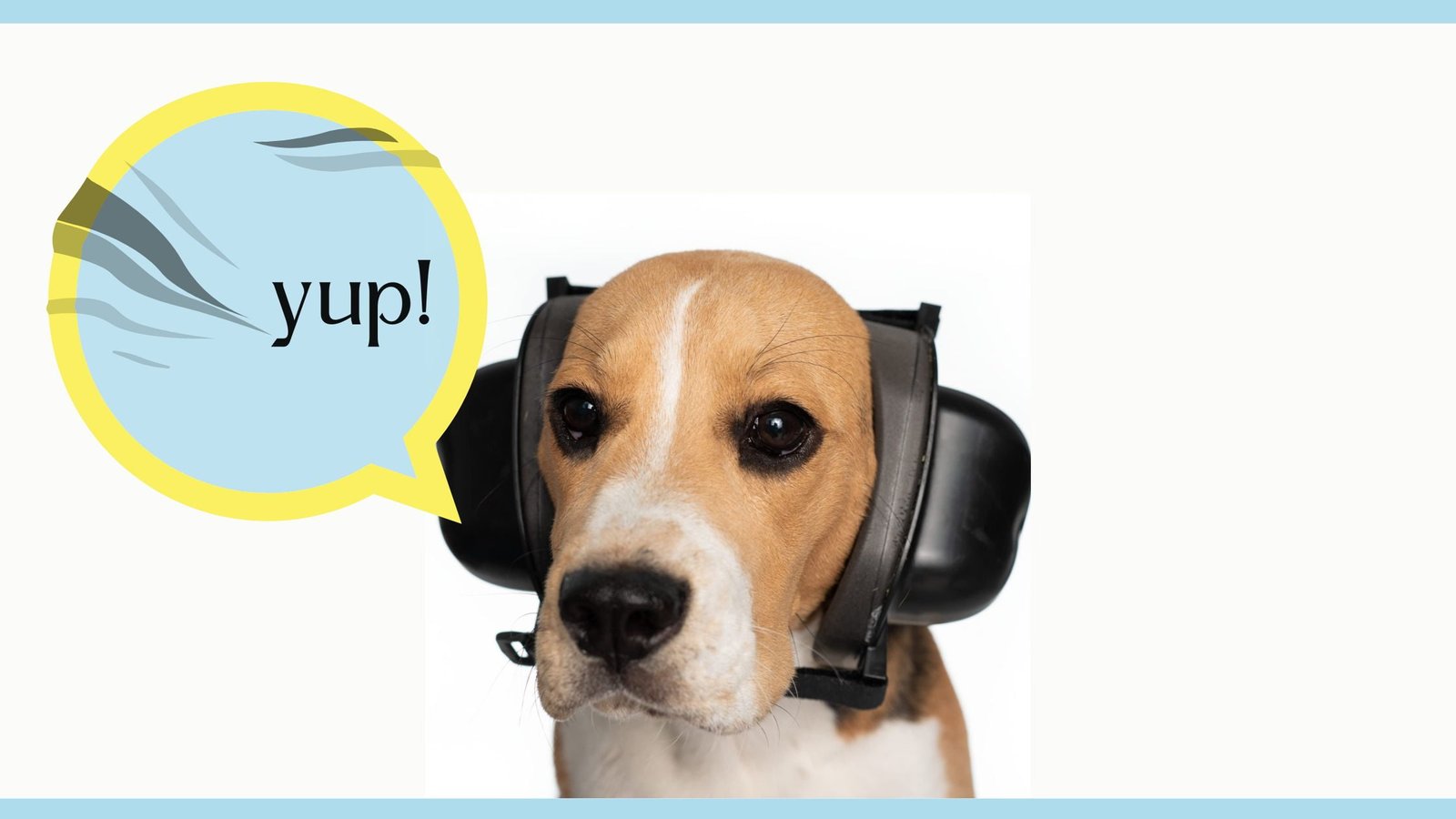
KEEPING DOGS’ EARS SAFE
Dogs rely a lot on their hearing every day. Loud sounds like fireworks or gunshots can damage their ears. Over time, this could make them lose their hearing or have other ear problems.
How to Protect Your Dog’s Ears
It’s best to keep your dog away from really loud noises whenever possible. Don’t let them get too close to things like fireworks, gunshots, or blasting music. All that noise can freak them out and harm their ears.
If you can’t avoid loud sounds, try using ear protection like doggy earmuffs or earplugs. These can block out some of the dangerous noise levels. They’re great for thunderstorms or crowded events where it’ll be super noisy. There are special products made just for protecting dogs’ ears from loud sounds.
Be mindful of the volume when using household gadgets like vacuum cleaners or hairdryers. While they may not seem too loud to you, these devices can actually hurt your dog’s ears over time. Use such appliances in a different room or keep some distance from your furry friend.
Be Aware of The Sounds Around Your Dog and Regularly Practice Ear Hygiene
When using headphones, keep the volume low. Dogs hear differently than humans. Sounds pleasant to us might feel too loud or annoying for them. So avoid using headphones near your pup if possible. Clean your dog’s ears regularly to prevent wax buildup or infections that could affect their hearing.
Dogs are prone to ear infections. Wax or debris buildup can block their ear canals and impact their hearing ability. Use a gentle ear cleaner recommended by your vet and follow their instructions for effective ear cleaning. By taking these precautions, you can maintain your pet’s hearing health and ensure they keep enjoying the world around them. Remember, a dog’s hearing is precious, and it’s our duty to protect it.
